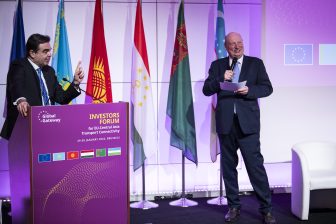
More EU funding needed for completion TEN-T network
Over forty stakeholders from the transport and related sectors jointly unveiled the Ljubljana Declaration, asking for an increased EU budget for the Connecting Europe Facility (CEF) under the post-2020 Multiannual Financial Framework (MFF). This is needed to facilitate the completion of the TEN-T network. The required funding amounts to 500 billion Euros between 2021 and 2030, the declaration stated on the occasion of the 2018 TEN-T Days in Ljubljana.
The Multiannual Financial Framework (MFF) is a seven-year financial framework regulating the annual budget of the European Union. The next MFF, covering the period 2021-2027 will be presented on the 2 May 2018. The Connecting Europe Facility (CEF) is considered to be the core financial instrument for the transport sector.
Core financial instrument
CER Executive Director Libor Lochman said: “The Connecting Europe Facility offers the best guarantee to deliver high EU added value in the transport sector, and provides an opportunity to finance the actual deployment of sustainable transport projects. An increased EU budget for CEF under the next Multiannual Financial Framework will ensure the completion of the TEN-T core network by 2030.”
Under the current MFF (2014-2020), 21.3 billion Euros in transport funds were allocated, this accounting for ninety per cent of the CEF budget, according to Petri Sarvamaa, Vice-Chair of the Budget Committee at European Parlement. “This 21.3 billion Euros triggered 41.6 billion Euros in investments in the transport sector.”
Parliament in favour of CEF
Sarvamaa said at the Rail Baltica Global Forum, recently held in Estonia that the European Parliament is a big believer in the usefulness of CEF, and that it stands for the reinforcement of this financial tool in the next MFF. “The upgraded CEF programme should cover all modes of transport, and we are for prioritising rail links for comprehensive networks and modes of transport that contribute to reducing CO2 emissions. Now is not the time to cut transport funding.”
The Ljubljana Declaration came as a result of the CEF Transport Campaign, carried out by over forty European associations and stakeholders representing transport infrastructure managers, operators, contractors, local and regional authorities, logistics service providers, shippers, users and equipment suppliers in the maritime, inland waterways, railways, road, cycling, aviation and intermodal sectors, as well as supporting industries and companies.





